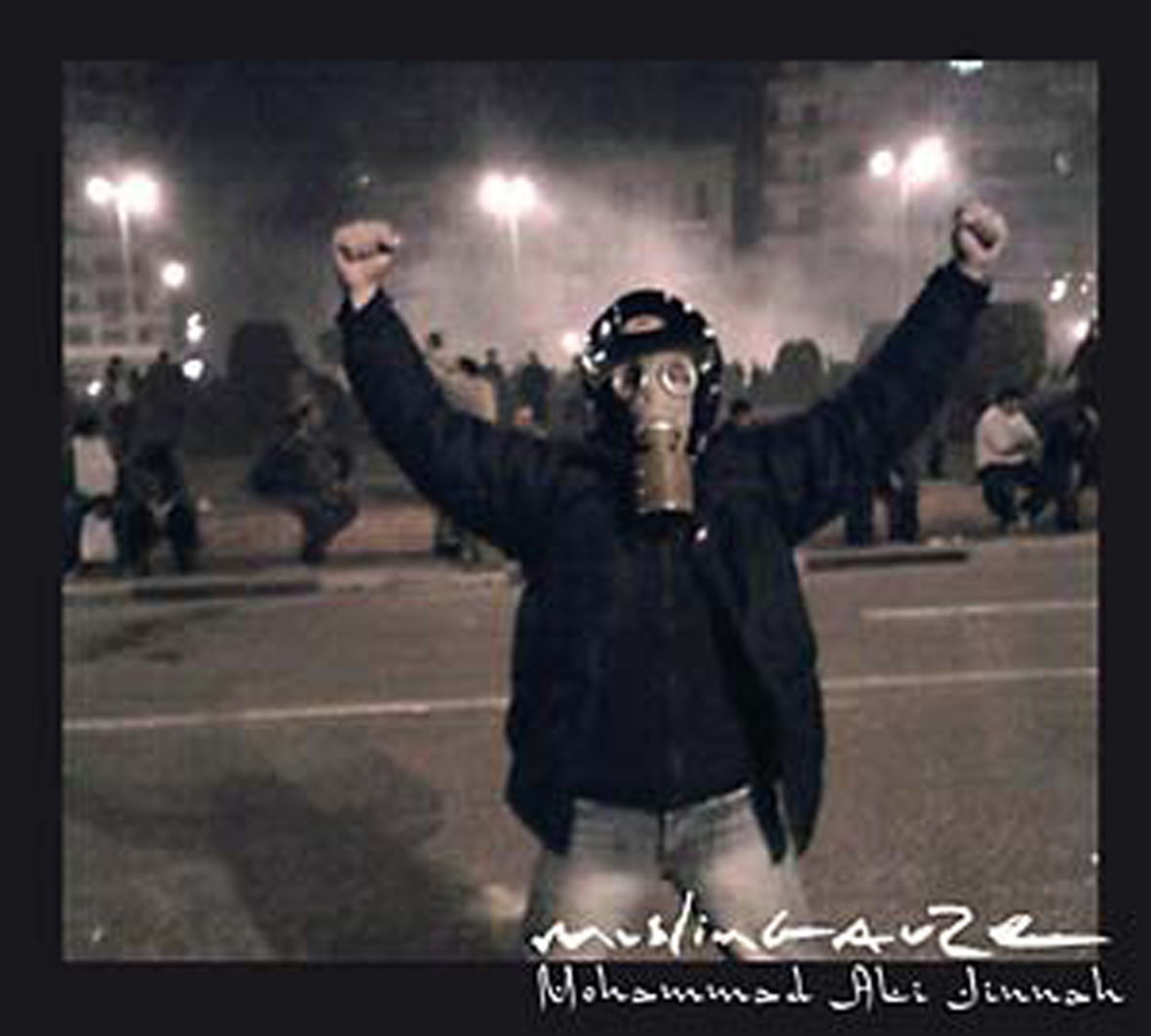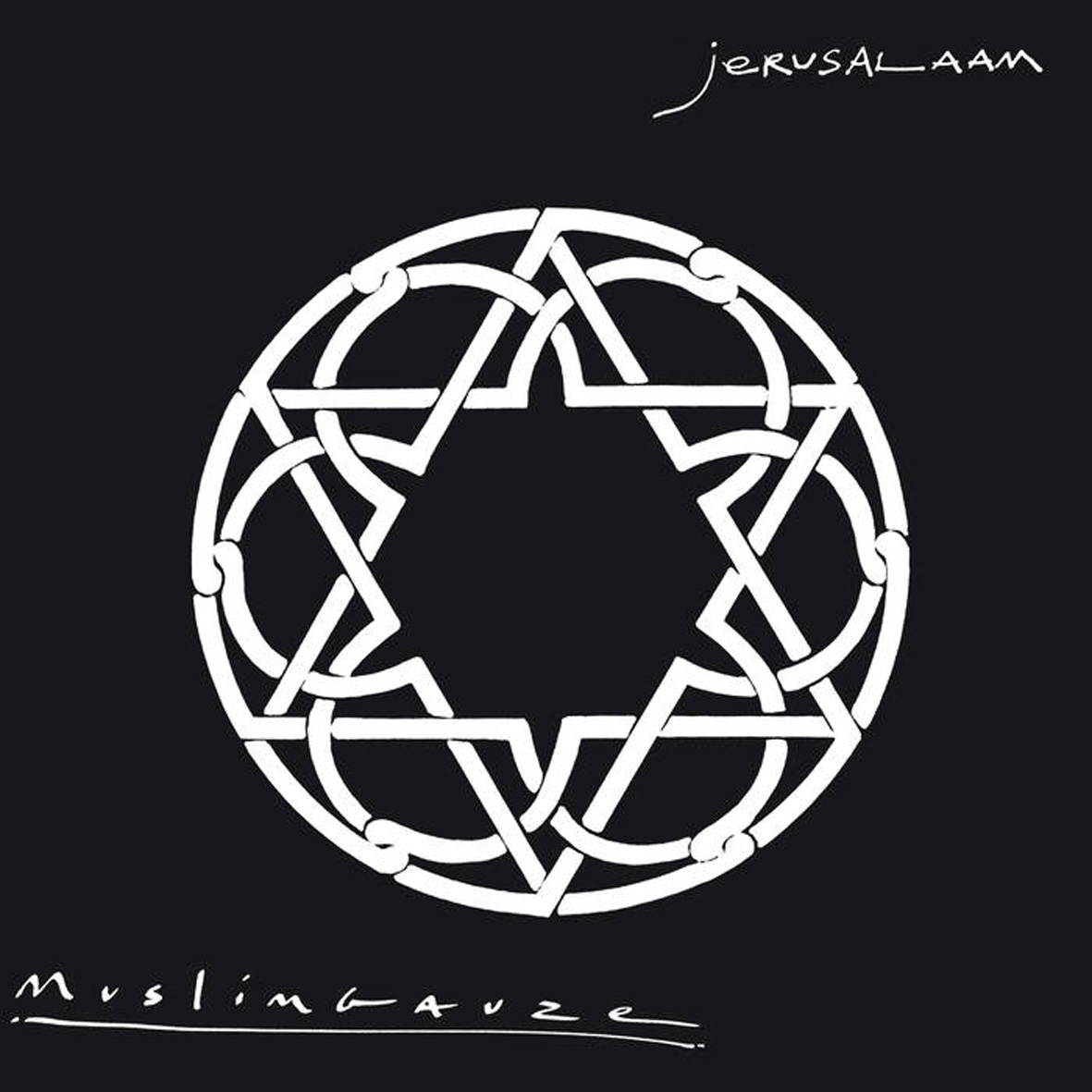 Staalplaat's tireless trawl through Bryn Jones's endless archive yielded yet another fine pair of releases to close out 2016.  Jerusalaam, the stronger and more traditionally Muslimgauze-esque of the two,  is not so much a new find as it is a straight-up reissue of the fourth album from 1998's Tandoori Dog boxed set.  However, that absorbing and varied release is expanded with a couple of lengthy unused pieces recorded for the Return of Black September album.  The much stranger Mohammad Ali Jinnah album has an even more perplexing and convoluted provenance, as it is basically an alternate version of 2002's Sarin Israel Nes Ziona, with significant variations in sequence and song lengths.  Staalplaat rightly describes it as "a release unlike anything else in Jones' discography," as classic Muslimgauze fare rubs elbows with some rather spirited forays into frayed breakbeats, experiments in obsessive repetition, and four-on-the-floor house thump.
Staalplaat's tireless trawl through Bryn Jones's endless archive yielded yet another fine pair of releases to close out 2016.  Jerusalaam, the stronger and more traditionally Muslimgauze-esque of the two,  is not so much a new find as it is a straight-up reissue of the fourth album from 1998's Tandoori Dog boxed set.  However, that absorbing and varied release is expanded with a couple of lengthy unused pieces recorded for the Return of Black September album.  The much stranger Mohammad Ali Jinnah album has an even more perplexing and convoluted provenance, as it is basically an alternate version of 2002's Sarin Israel Nes Ziona, with significant variations in sequence and song lengths.  Staalplaat rightly describes it as "a release unlike anything else in Jones' discography," as classic Muslimgauze fare rubs elbows with some rather spirited forays into frayed breakbeats, experiments in obsessive repetition, and four-on-the-floor house thump.
My interest in Staalplaat's Muslimgauze archive has alternately waxed and waned quite a bit since its inception, but I have definitely found myself appreciating the curatorial decisions quite a bit more than usual lately.  As I get deeper and deeper in Bryn Jones's oeuvre, it has become clear that there were definitely brief periods of white-hot inspiration mingled with work that does not feel particularly visionary or crucial by 2017 standards.  To their credit, Staalplaat have been doing a stellar job digging into and expanding upon the body of work that still feels fresh and contemporary today.  Also, my exasperation over the sheer volume and repetition of the Muslimgauze discography has unexpectedly dissipated quite a bit as well.  Case in point: the Mohammad Ali Jinnah album is essentially the Sarin Israel Nes Ziona album obsessively tweaked and reworked by Jones as he restlessly awaited Sarin's release.  Naturally, there is a lot of duplication and redundancy between the albums, but given how insanely sprawling the Muslmgauze discography is, it is probably safe to say that plenty of fans that have never heard Sarin and now they probably do not need to, unless they are floored by Mohammad Ali Jinnah and desperately crave more of the same.  It is certainly confusing, but there is no harm in supplanting previous releases if the newer incarnations are good.  This one is good.
Understandably, most of Mohammad Ali Jinnah's best pieces were already present on Sarin, though many reappear in altered form.  For example, the manically kinetic and digitally burbling "Imam Fainted" has been wisely stretched from just over a minute to over three minutes.  The obsessive and sputtering locked groove brilliance of "Yousif Water Pipe Habit" is similarly expanded for good reason.  The album's most classic piece ("Rafia, In Her Voluminous Black Tent") stays roughly the same though.  Notably, "Rafia" is not radically different in structure from any of the other pieces, as just about all of Mohammad is devoted to simple percussive vamps with a minimal melodic hook and some peripheral snatches of field recordings.  Sometimes there are also sputtering and sizzling dub-wise production disruptions as well.  The key difference is primarily just that "Rafia" has the coolest and most sensuous groove on the album.  The crackling, head-bobbing rhythm of "Zahir Din, Cab Driver of Zind" and the blown-out clattering of "Kurds Eye View" are also stand-outs, but they mostly adhere to the expected template.  It is easy to see how Jones was able to churn this stuff out on an industrial scale given the "Ok, this loop goes with this beat-done!" approach clearly employed here, but the clarity and simplicity of the process does not make the end results any less effective.
While "Rafia" is probably the only legitimately essential piece on the album, the real appeal for me lies in the sheer exuberance and the unexpected pop influences present in some of the other material: roughly half of Mohammad feels like business as usual, but the rest feels like a very strange and fun party.  In particular, the relentlessly insistent beat of "Abu Kaff, Your Guide Around A West Bank Bedouin Shack" is an especially entertaining treat, even if the actual music feels kind of like an afterthought.  I think Bryn basically just came up with the perfect beat and hit "play." "Because He Had A Mustache And Beard, They Thought He Was An Arab" is a similarly successful attempt at a floor-filling club banger, though it is fleshed out a bit more with a cool backwards string melody and some echoing and unexpected stops.  Elsewhere, "Abdullah Kosher Halal" feels like Jones attempted to apply his dub techniques to hip-hop with interesting and fitfully successful results.  Those pieces are what make Mohammad such a genuinely fun and worthwhile release, as there are already plenty of great Muslimgauze songs and albums out there in the world, but not many that capture Bryn Jones in full-on party mode.
Samples:
- Rafia, In Her Voluminous Black Tent
- Yousif Water Pipe Habit
- Abu Kaff, Your Guide Around a West Bank Bedouin Shack

By contrast, Jerusalaam feels like an album where Jones had a very clear vision and poured considerable time and care into realizing it.  That makes sense, as the Tandoori Dog vinyl boxed set is one of the more ambitious and significant releases in the Muslimgauze canon, even if I have not exactly loved all of the previous reissues from it.  I guess Staalplaat saved the best for last, as Jerusalaam is the final of the four original LPs to finally be reissued as a stand-alone album.
Stylistically, it is not a far cry from the bulk of Mohammad Ali Jinnah, albeit with all of the contemporary dance elements excised.  Instead, there is plenty of traditional hand-percussion, thick and distorted bass, drifting field recordings, and exotic snatches of melody.  In short, all the elements of a classic Muslimgauze album are in place and in sharply realized and vibrantly percussive form.  Also, there is a minimum of filler and atmospheric meandering to boot.  This is a strong collection of fully formed and thematically coherent songs that feel like they belong together.  That is certainly not something that I can say about every Muslimgauze album, even the ones that were not compiled posthumously.  The crown jewel from the original album is probably the woozily dissonant and off-kilter groove of "Under the Burka," which somehow manages to sound simultaneously sinister and clunkily infectious.  Also, its deep and fuzzed out sub-bass sounds like it could have been recorded today.  Another great piece (after a bizarre and unrelated-sounding intro) is the sexy and understatedly beautiful "Sufiq Gulf Breeze 1-2."
Elsewhere, I was quite fond of the reckless and disjointed "Lime Green Turban Gang," which is based upon an obsessively repeated and dramatic string loop, but is jarringly disrupted by unexpected volume shifts and blown-out, in-the-red textures.  Also, it sounds like most of the song is pushed so far into the background that it seems like another song altogether playing in a separate room–it is a very strange piece indeed.  If Jerusalaam had not been an actual album that Jones created in his lifetime, I would swear that "Gang" was just an unfinished sketch in the very early stages of songhood.  Bryn definitely made a lot of bizarre and adventurous decisions with this album, but that is probably why it works: Jerusalaam is not necessarily packed full of Muslimgauze’s greatest motifs, but there is a hell of a lot happening here and almost all of it is interesting.  I could listen to Bryn Jones mangle and twist his grooves all day long.
That said, I am still quite grateful that this version of Jerusalaam also includes one of Muslimgauze’s greatest extended motifs in the form of an orphan from the Return of Black September album.  Clocking in at about 15 minutes, the first of the two identically named pieces more or less steals the entire show, unfolding as a shifting, slow-burning, and hallucinatory ride cymbal groove.  Snatches of dialogue fade in and fade out and echo away into oblivion while the beat unpredictably dissolves and re-coheres again and again.  In fact, for the longest time, it just feels like Bryn just spontaneously erupted into a simmering drum solo alone in his room, but a subtly haunting two-chord progression kicks in around the half-way point to give a hint of structure and darken the mood.  Unlike most Muslimgauze pieces, however, the structure never fully locks in, so the piece evolves like an organically unfolding, richly vibrant, and half-menacing/half-beautiful dream.  Curiously, the second "Unused Return Of Black September" is a very different, lesser, and perversely placid piece, though several of the components seem to be the same.
Much like with Mohammad Ali Jinnah, Jerusalaam probably only has one truly essential piece to make it stand-out ("Black September," of course), but there are a handful of other legitimately great pieces here as well.  While there are probably other Muslimgauze songs out there that sound a hell of a lot like some of them, the cumulative effect is still quite impressive.  More significantly, I find the sheer depth, dynamic variety, and passion for experimentation here even more compelling than the unusually high volume of strong "singles."  While I do not think Jerusalaam is quite a stone-cold classic, it is quite a remarkably good album and it strikes a perfect balance between immediately gratifying hooks and absorbingly complex experimentation.  Some Muslimgauze albums are easy to wrap my head around in just one or two listens, but this one is a bit more mysterious than most. I appreciate that.
Samples:
 
Read More

